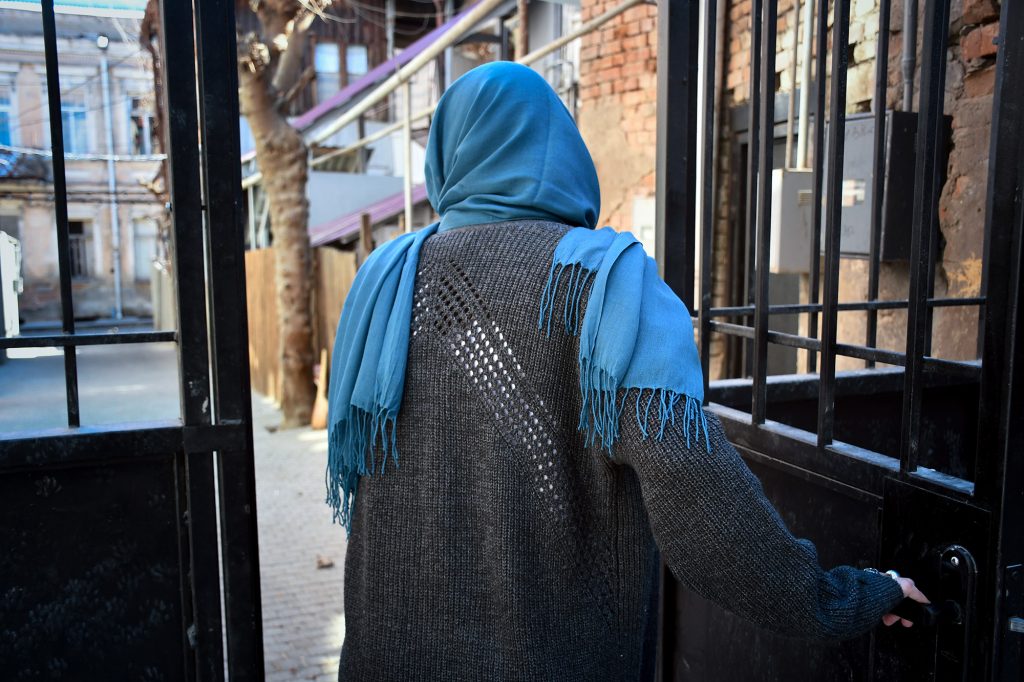According to Chechen tradition, a divorced woman cannot return to her parents’ house with her children, since the children ‘belong to’ the man and he and his family are responsible for them. Jamilya (not her real name), shared her story of separation with OC Media.
‘My ex-husband — the father of my children — worked in a construction company, and often used to travel to other cities. On one of his business trips, he met another woman. He left me and never returned. I stayed with my two children at his grandparents’ house.’
‘I had been waiting for him for a year. Back in the early 1990s, there were no phones so I couldn’t contact him or go and visit him and try and figure out what was going on.’
‘I got married at 19 after failing to get into university after school. I wasn’t allowed to return to my parents’ home with the children, as my mother told me my brothers would not allow me in.’
‘I left because I knew that if I stayed there, I would not achieve anything in life. I was thinking: I’ll leave, go to university, find a job, buy an apartment, and then take my children. But everything dragged on.’
‘My father’s will stated that, “If the children are left without a father (for example, if he dies or goes to jail), then let my daughter take her children and bring them up in my house. In other circumstances (for example, if my son-in-law marries someone else or leaves the family) — no way.” My father wrote that it would be unforgivable if my brothers did not take control of this situation.’
‘You will not leave when I fall asleep, will you?’
‘I was planning to take my girl with me. I tried to put my son to sleep but it was like he sensed something was wrong. He kept getting distracted, asking me questions.’
‘He asked me: “You’re not going to leave when I fall asleep, are you?” I replied: “No, I will not leave”. He turned and fell asleep, and I took my daughter and left to my parents.’
‘I strongly regretted not taking him with me. I suffered so much without him.’
‘Two weeks later, my brothers told me through our mother that I must either return to my ex-husband’s family or return the girl to them, because she was “not ours”, she “didn’t belong here”. “We cannot be responsible for her,” they said.’
‘They pressured me psychologically. They kept telling me that these are not our children, that we were not responsible for them, that the children didn't belong here. And they kept reminding me that our father’s last wish was that the children should not return.’
‘At that time, I didn’t have a job and was dependent on my mother and older brothers, and these words… So I did it.’
‘I often used to sneak to my ex-husband’s house to see my children, but his relatives did not allow me to do it. I hoped that because the kids were small they would accept me, but they didn’t.’
‘I sent anyone I could to go the house to negotiate on my behalf: respected people from our village, elders, mullahs. I begged them to let me see my children. But each time I received the same answer: “She abandoned them and left, so they are our children. She is nobody to them. We will raise our children all by ourselves.”’
‘During this period, my daughter called me several times asking me to write a statement that I had given them up. My husband’s grandmother and other relatives persuaded my children that I didn’t need them. “She’s gone and left you behind”, they said. My children became afraid to meet me.’
‘My mother-in-law forged a statement saying that I was giving up my rights as a mother. She took custody of the children and was being paid benefits by the government. I told her: “I do not need this money. Just give me back my children.” She replied: “No. When they become adults, they will return to you if they want.’
‘I lived with my mother and my younger brother. To earn a bit of money, I sold apples and pears on the market and collected scrap metal. I wanted to buy toys or clothes for my kids. But my relatives wouldn’t take anything from me.’
‘Many women in Chechnya want to abandon this tradition’
‘Sane parents who do not use their children as leverage when getting divorced and let the mother communicate with them are a rarity. Most often, the husband and his relatives believe that once she’s gone — that’s it. Children are always set against their mothers: they are told their mother is bad, she has abandoned them.’
‘After the divorced man remarries, his children from the first marriage become outcasts. Then the stepmother starts hating them and setting the father against the children.’
‘I’m sure that many women in Chechnya want to abandon this tradition. But I don’t think anything will change given the situation in the republic at the moment. Instead, a special commission has been formed to ensure that families do not get divorced.’
‘Perhaps if women’s relatives supported them, the children would stay with their mothers. But often they believe that after a divorce, the children become strangers and should stay with the other family.’
‘Because of this tradition, women often cannot leave their tyrant husbands because they would be deprived of their children. Men take advantage of the fact that women are vulnerable in this situation. In some families, it can result in physical abuse. Defenceless women who have no male relatives are often bullied.’
‘I've been working myself into the ground’
‘When the war started, my children were moved — but I didn’t know where. I searched for them for so long! Nobody told me where they were, or even if they were alive. I managed to find out that my children had been taken in the direction of Dagestan and were alive and well.’
‘I worked at a school in Grozny as a teacher of Chechen language and literature. Sometimes my salary was not paid for months. I had to clamber in the deserted gardens of those who left Chechnya because of the war. The fruit used to rot on the trees. I collected apricots and cherries and sold them at the market. I worked myself into the ground.’
‘After the war, I felt that I was already strong enough to take my two children and provide for them on my own. I came to the village to collect my children and went to their house one more time, but they never gave my children to me.’
‘I didn’t see my daughter again until 13 years later, when she was 18. My mother died and on the day of the funeral, my ex-husband’s relatives came and brought my daughter to me. But I was so devastated because of my mother’s death that I hardly felt anything from the long-awaited meeting with my daughter.’
‘My son was 14 years old when he first phoned me. He contacted me of his own will. He wanted to speak to me.’
‘I have achieved everything’
‘For a long time, I was angry at my father. Who leaves such a will? And at my brothers too. My sister and I often talk about this. Now she says: “My God, how could I have been so oblivious? Why did I let them do this to you?”’
‘Today I have a great relationship with my children. I am 48 years old, I have achieved everything: I am financially independent, I was able to buy housing for my children, and a car for my son.’
‘My children already have their own families, and I do everything to ensure they do not get divorced and that they raise their children together.’
‘I still resent my ex-husband’s relatives. I left Chechnya in the early 2000s. When I come to my native village, I don’t meet them. If I see them, I don’t even say hello. They are strangers to me.’
‘I haven’t gone for a walk with my kids since they were small. We haven’t had dinner together at the family table. I haven’t even been to a cafe with them. I haven’t kissed my children goodbye as they left for school and I wasn’t at their graduation. I’ve missed a lot. I will never forgive myself for this.’
‘Recently, there was a post on Facebook: “If you had five minutes left to live, whom would you call?” The first thing that occurred to me: I would call my son and ask him to forgive me for the fact that many years ago, when he turned to me and, looking into my eyes, asked: “You will not leave when I fall asleep, will you?”, I deceived him and left. This is what I am most sorry about.’




 26 February 2020
26 February 2020




